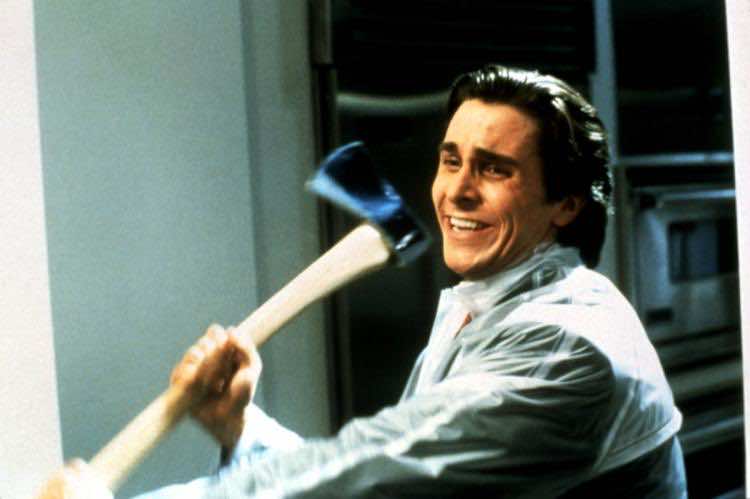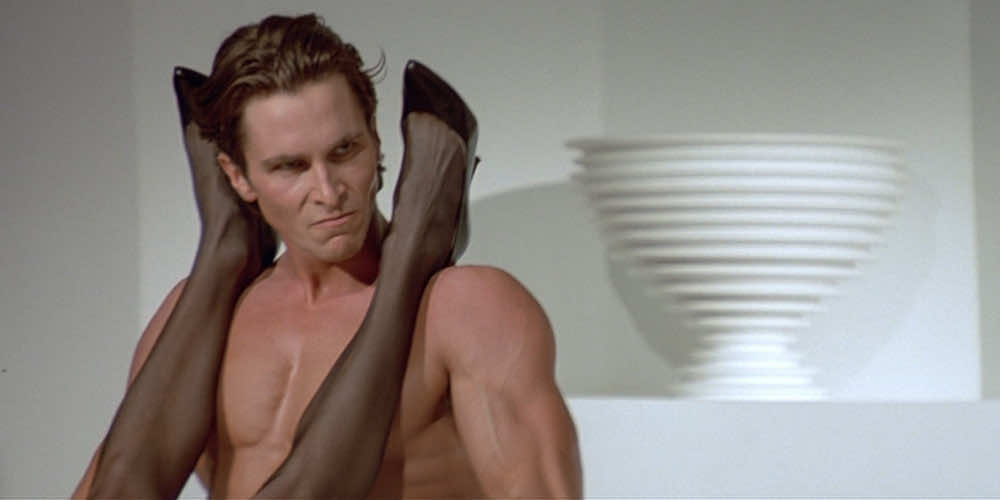
Bret Easton Ellis’ 1991 book American Psycho offered a rather harrowing look back at the seeming end of yuppie relevance in the late 1980s from the comfortable perspective of a new decade. But Mary Harron’s turn-of-the-millennium cinematic take proved that the novel did not have the last word on a culture that has lost touch with its humanity through greed and vanity. It stands as a testament to the power of the shadow. In Jungian terms, it’s that darker side of the unconscious that the consciousness refuses to identify with. As much as you try to rise above, it’s there. And now our country has somehow elected a psychotic, misogynistic yuppie to our nation’s highest office. So why wouldn’t the Coral Gables Art Cinema bring back American Psycho to the big screen?
When Christian Bale’s Wall Street mergers and acquisitions specialist Patrick Bateman claims to have humanity during dinner at one of the many fancy restaurants he dines at to impress others with his skills at obtaining reservations, he ticks off bullet points of concern that once occupied the American mindset of the 1980s: “We have to end apartheid for one, and slow down the nuclear arms race, stop terrorism and world hunger. We have to provide food and shelter for the homeless and oppose racial discrimination and promote civil rights, while also promoting equal rights for women. We have to encourage a return to traditional moral values. Most importantly, we have to promote general social concern and less materialism in young people.”

Yet nothing in anyone’s actions in this film ever shows any real concern for this. American Psycho is a film about illusions. It begins with the opening credits. As the titles appear against a white backdrop, drops of a red liquid randomly fall next to them. It turns out to be syrup used to decorate one of the fancy dishes Bateman and his ilk imbibe in. Even the music, by John Cale, turns from creepy to effervescently posh. It’s a stylistic touch Harron uses throughout the film, a cue that the audience should always be taking the actions on-screen with a bit of skepticism. That it so often feels so literal is testament to the careful line the filmmaker walks to speak about the duality of man.
American Psycho is filled with phantoms. With a quick pan of a camera, screams on the soundtrack between cuts are revealed to have come from a TV. In Bateman’s first interior soliloquy, he introduces himself as nothing more than an “idea.” Then, in a sinister layer that can only come from viewing the movie in a post-president-elect Trump world, both Donald and Ivana Trump appear as mere illusions. In a scene where Bateman tricks his drugged, intoxicated mistress (Samantha Mathis) into going out with him, he deflects her conversation in the back of a limousine by looking toward the window and asking “Is that Donald Trump’s car?” In another meeting with a drunken character in his life, Paul Allen (Jared Leto), Bateman tries to defuse Allen’s protests of the empty Mexican restaurant by looking over his shoulder and asking, “Is that Ivana Trump over there?” Paul, who often confuses Patrick with another colleague says, “Jeez, Patrick — I mean, Marcus — what are you thinking? Why would Ivana be at Texarkana?” The Trump obsession by these shallow people speaks scarily true to that same obsession — from the mainstream media to the voters — that helped elect Trump — a man who never held public office — into the Oval Office.

Turning to lighter elements of this wondrous indictment to all that was horrid about the 1980s and by extension today, the editing by Andrew Marcus is consistently delightful. The appearance of Genesis’ “In Too Deep,” as Bateman plays suave for two call girls carries an ironic touch of hilarity that taps into the darkness of the shadow aspect, as with the dramatic irony of the audience’s deeper awareness of what fate may befall these women becomes apparent based on what has already happened to Allen to the soundtrack of Huey Lewis and the News’ “Hip to be Square.” Just as the coo of Collins’ voice rises above the twinkle of Tony Banks’ piano, there is a cut to a close of a CD in Bateman’s hand. Phil Collins’ face on the cover of No Jacket Required fills the movie screen before a quick cut to Bateman as he says, “Do you like Phil Collins?” He smiles and raises his eyebrows as he rhetorically addresses the ladies.
Truly, it is Bale who delivers the punchline in this quick sequence of cuts. With his over-the-top gestures throughout the film, American Psycho was his breakthrough performance and carries the film’s energy. Despite what the Academy thought (Sorry, Russell Crowe) in the year 2000, it was Bale who really gave the performance of the year as Patrick Bateman. It was American Psycho that made the Welshman an actor to watch. Bale’s performance is nothing short of epic. His deadpan is unmatched. He owns the close-ups with that strained smile and nod and squinted eyes. It’s also the face that reportedly made the film originally earn an NC-17 rating. If memory serves, I once read a report that the MPAA’s biggest problem during a menage-a-trios Bateman has with the call girls was how often and for how long he looked at himself in a mirror during the scene.

Though there an array of mortifying scenes of misogyny, from statements like “There is no such thing as a girl with a good personality” to actual dismemberment of women, Harron constantly drops hints that maybe Bateman never truly commits any of the more brutal acts. As unhinged as Bateman seems, it’s not because he is truly psychotic as much as society’s essentially denying his relevance despite a seeming psychosis. Something must break, as an epic meltdown awaits in the film’s penultimate scene where a desperation for recognition and a pain for lack of it goes hardly recognized, not matter the bloodbath.
It is this lack of human connection taken to an extreme where empathy has no chance and what the absence of that can do to a man, and by extension a culture, that is the true horror of American Psycho. Bateman isn’t due a comeuppance. It’s worse than that. He is ignored. It’s not Patrick Bateman who is the villain but a world gone hollow. His presence is obliterated in front of his own eyes, and the only one who maybe recognizes is his lonely secretary (Chloë Sevigny) after she finds some doodles in his desk drawer while she is alone. It all culminates in a big “whatever.” Never has a more active film captured nothingness as well as Harron’s version of American Psycho. And that this movie is still relevant to this day is what’s scariest of all.
American Psycho runs 101 minutes and is rated R. It screens for one night only at the Coral Gables Art Cinema tonight, Saturday, Nov. 26, at 11:45 p.m. on 2K DCP. It’s part of the theater’s After Hours program.









